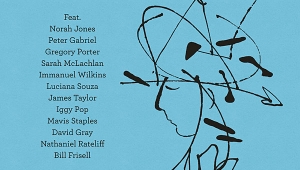| Columns Retired Columns & Blogs |
Recording of February 1996: Walton: Belshazzar's Feast
WALTON: Belshazzar's Feast; Suite from Henry V; Crown Imperial (Coronation March)
Bryn Terfel, bass-baritone; Bournemouth Symphony Chorus (Neville Creed, Chorus Master); Waynflete Singers—semi-chorus L'Inviti (David Hall, Chorus Master); Andrew Litton, Bournemouth Symphony Orchestra
London 448 134-2 (CD only). Chris Hazell, prod., Simon Eadon, Jonathan Stokes, Philip Siney, engs. DDD. TT: 60.25
Bryn Terfel, bass-baritone; Bournemouth Symphony Chorus (Neville Creed, Chorus Master); Waynflete Singers—semi-chorus L'Inviti (David Hall, Chorus Master); Andrew Litton, Bournemouth Symphony Orchestra
London 448 134-2 (CD only). Chris Hazell, prod., Simon Eadon, Jonathan Stokes, Philip Siney, engs. DDD. TT: 60.25
From the opening shofar blast on the trombones and the chorus's mournful recitative, "Thus spake Isaiah," we know we're in for something special which involved every element and every last participant in this new recording of William Walton's Belshazzar's Feast. In what is one of his finest performances yet, Andrew Litton leads Belshazzar with a level of energy and apparent lack of inhibition reminiscent of the late Leonard Bernstein.
We've grown accustomed to the high standards of regional British orchestras, just as we have the upgrading of former "minor league" American orchestras. We're also aware of the magnificent British choral tradition, manifest at every level at which the citizens of the British Isles sing together. One takes the excellence of uniform pitch, diction, and dynamics as givens. This recording reveals an additional level of expressive uniformity rarely heard from groups of any type of musicians, singers, or instrumentalists.
The chorus gives a dire, chilly warning to the Children of Israel in "Thus Spake Isaiah." Their grief is heartbreaking as they weep "by the waters of Babylon." Grief turns to righteous indignation and rage as the pagan Belshazzar's wives and concubines "drink from the sacred vessels which his father Nebuchadnezzar had taken out of the Temple that was in Jerusalem." The chorus goes pagan to praise the gods of gold, silver, and all that other great stuff that made life in the ancient world worth living. After Belshazzar is "slain and his kingdom divided," the chorus indulges itself in a veritable orgy of ecstasy that "Babylon the Great is fallen." Throughout these mood changes, the capacity for three combined choirs to express themselves as a single voice never falters.
One of the great male soloists of the current opera and concert world, Bryn Terfel, has the show stolen from him by the choirs. When he gets his shot at the mike, he can't resist overemphasizing the anguish of "If I forget thee O Jerusalem." And by being so precious about each of the goods on sale at the market in the "Babylon was a great city" recitative, he defeats the delicious ironic punch of the closing line. Still he does manage the handwriting-on-the-wall episode with the hallucinatory terror that Walton wrote into the music.
The Bournemouth Symphony provides a virtuoso foundation, labor-intensively overscored by Walton's bizarre and picturesque percussion, with antiphonal brass bands in addition to the full brass section in the orchestra.
Chris Hazell leads a team of engineers no less virtuosic than the performers themselves. Each of the works was recorded in Winchester Cathedral, where moving a microphone a few feet one way or the other can mean the difference between a Grammy nomination and a career change. In this case, a Grammy would provide suitable recognition for a difficult job for once done right. This recording has none of the clangor, loss of detail, or phony "bigness" of so many large-scale church recordings. Most important, there is none of that killer digital hash that is so often a byproduct of such recordings from major-label production teams.
In the key opening "Isaiah" recitative, one can hear the chorus hearing itself directly, and by reflection off the variedly distanced stonework and masonry surfaces, to which they tune and express themselves accordingly. The miking is sufficiently spotted to catch the details with believable presence, but nothing is "in your face." There are no digital hush-outs, and all the decay sounds come across with a distinctive aural signature which hauntingly whispers "church." You can practically smell the incense.
If the remaining two works on the disc seem to be anticlimactic fillers, guess again. Henry V is done to a fine turn, and reveals another side of Litton's palette with a very Stokowski-like approach to hushed pianissimo and floating agogics in the "Death of Falstaff" passacaglia. If the grandiloquence of Crown Imperial is just too much after all this, come back to it later; or start with it, and take a rest before going on.
In any event, this recording should revive interest in a work to which many listeners have become jaded, and should provide inspiration to choristers and choral directors, not to mention endless possibilities for entertainment and demonstration material to audio professionals and hobbyists.—Richard Schneider
- Log in or register to post comments




































